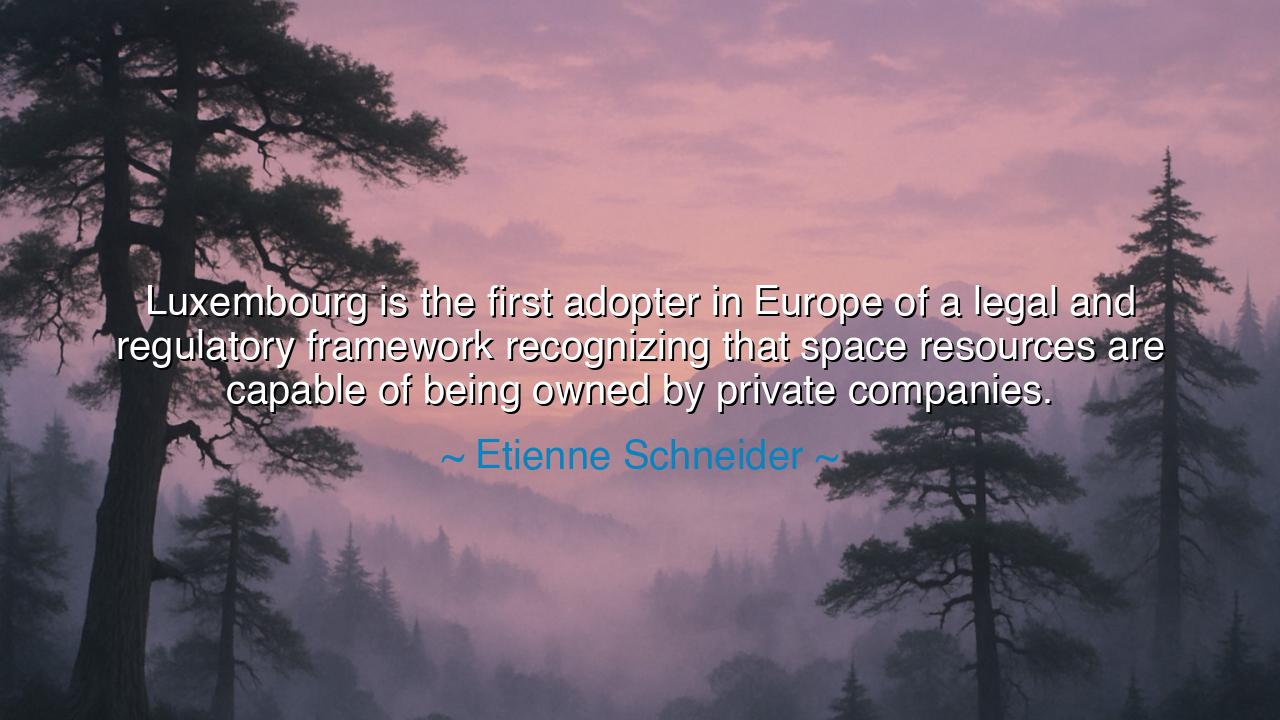
Luxembourg is the first adopter in Europe of a legal and
Luxembourg is the first adopter in Europe of a legal and regulatory framework recognizing that space resources are capable of being owned by private companies.






The words of Etienne Schneider, “Luxembourg is the first adopter in Europe of a legal and regulatory framework recognizing that space resources are capable of being owned by private companies,” sound as if they were spoken from the very threshold between epochs — the age of Earth and the dawn of the stars. In this statement, we hear the hum of a new frontier, where law, ambition, and cosmic wonder meet. For millennia, humanity looked up at the heavens with reverence, seeing in them the dwelling place of gods and mysteries beyond reach. Now, we stretch our hands toward those same stars, not with offerings, but with contracts; not with prayers, but with legal frameworks. Schneider’s words mark not merely a bureaucratic milestone, but a moment when humanity declared: the sky is no longer untouchable.
In ages past, empires rose upon the discovery of new worlds. When the oceans were the frontiers, explorers and kings battled not only with wind and wave but with questions of ownership and law. Who claimed what was found? Who decided the rights of discovery? These questions tore and remade the world, just as the voyages of Columbus and Magellan reshaped the map of the Earth. So too now, in this new era of celestial exploration, we face the same ancient dilemma — not upon seas of water, but seas of stars. The space resources Schneider speaks of — metals, water, minerals — are the new gold, the new oil, the new promise of wealth beyond imagination. But with such promise comes peril: the peril of greed unbound by law, of conflict born among the constellations.
In 2017, the small yet visionary nation of Luxembourg rose like a beacon of foresight among larger powers. With courage and clarity, it became the first European country to declare that resources found in outer space could be owned by private entities — that companies mining asteroids or distant moons could claim what they extract, just as miners once claimed the riches of the Earth. This was no act of recklessness, but one of audacity tempered by reason. Etienne Schneider, then Deputy Prime Minister, knew that if humanity were to reach beyond Earth, it must bring with it a sense of order, not chaos; of law, not conquest. He understood that dreams, if left without governance, can decay into nightmares.
To understand the gravity of this act, recall the story of the Treaty of Tordesillas in 1494, when the Old World powers — Spain and Portugal — divided the globe with a line on a map, claiming dominion over lands they had not yet seen. The arrogance of that division birthed centuries of empire, glory, and suffering. Yet it also brought forth the beginnings of international law — rules, however flawed, that sought to bind power to principle. Luxembourg’s declaration may well serve as our modern counterpart, an effort to bring ethical structure to a limitless domain before it becomes another theater of unrestrained exploitation. Schneider’s vision reminds us that to reach the stars is not enough — we must do so with wisdom.
But beneath the triumph of this legal innovation lies a deeper question — one as old as civilization itself: Can something that belongs to no one truly be owned? When we claim the dust of an asteroid or the water of a moon, do we honor human progress, or do we repeat the errors of our ancestors, who mistook possession for stewardship? Schneider’s statement, though rooted in legality, stirs the spirit to ponder morality. For as humanity moves into the vast silence of space, the measure of our greatness will not be how much we take, but how justly we take it. Ownership without reverence is a hollow victory.
Yet, hope glimmers in the intent behind Luxembourg’s pioneering law. It is not conquest that Schneider champions, but responsibility. In creating a framework where the heavens may be mined, he calls also for accountability — for humanity to bring its best self into the cosmos. Just as ancient lawmakers codified justice to civilize the wildness of men, so must modern lawmakers civilize the wildness of ambition. For in the darkness between worlds lies both peril and promise — and only the light of law guided by conscience can lead us safely through.
So, let these words be remembered by the generations that follow: when humankind reaches for the stars, let it do so not as a plunderer, but as a caretaker of creation. Let those who build new laws for new worlds do so with humility, knowing that their work will echo across the centuries. For as the Earth was once divided and healed by the wisdom — or folly — of its leaders, so too will the heavens reflect the hearts of those who first claimed to govern them. Walk boldly, then, into the infinite — but carry with you the ancient virtues of justice, restraint, and awe. Only then will the conquest of the cosmos become not the repetition of history, but the fulfillment of humanity’s higher calling.






AAdministratorAdministrator
Welcome, honored guests. Please leave a comment, we will respond soon